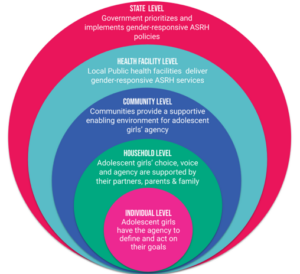“The beach bonanza. We had to drop that one.”
Joyce Thomas is sharing Adolescents 360 projects that didn’t make the cut.
As part of the program, PSI uses Silicon Valley-style human centered design tactics to co-create activities with the teens they serve with a goal of reducing the number of unplanned pregnancies.
Human centered design is fancy jargon for creating programs by surfacing ideas from the people those programs will serve. It’s bottom up, not top down. But this bottom up idea didn’t have the impact needed to keep it going.
“It was too complicated. The girls wanted to have fun at the beach. They didn’t want to talk about contraception. Plus, their boyfriends were there. It made it hard.”
Joyce is all about numbers. She studied applied statistics at university and when she joined the Adolescents 360 team, she gravitated towards analysis. How many girls are getting services? How did that scale from last week? How many touches does a girl need before she decides to get a contraception method? If testing ideas, which program has statistically significant results?
This is what keeps her going. “If we are going to reach the Millennial 20/20 target of “insert access to contraception here,” we have to achieve small milestones.”
Joyce read about PSI in Fema Magazine during her college days and was interested in their public health outreach. She returned to Dar es Salaam where she was born and raised for a semester during her third year. She visited the PSI office and threw herself into volunteering. She was soon brought on as an intern and eventually found her way to Adolescents 360.
“For me, success is getting the Kuwa Mjanja brand out into Tanzanian society as the trusted source for girls about body changes, sex, contraception and pregnancy prevention.”
When I was young, my mother just told me, “You’re growing up. Be careful.” I didn’t know what that meant. Teenage girls need someone trusted to talk to — it’s just too confusing.”
The need to reimagine reproductive health care for teens in Tanzania is urgent. 45% of the population is under the age of 15 and 44% of girls become pregnant by age 19. PSI’s Adolescent 360 program meets teens where they are — outside of clinics — and with language and activities that make sense for them.
Adolescents 360 (A360) is a four-and-a-half year initiative co-funded by the Bill & Melinda Gates Foundation and the Children’s Investment Fund Foundation (CIFF). The project is led by Population Services International (PSI) together with IDEO.org, University of California at Berkeley Center on the Developing Adolescent, the Society for Family Health Nigeria, and Triggerise. The project is being delivered in Ethiopia, Nigeria and Tanzania, in partnership with local governments, local organizations, and local technology and marketing firms. In Tanzania, A360 is building on an investment and talent from philanthropist and design thinker Pam Scott.



